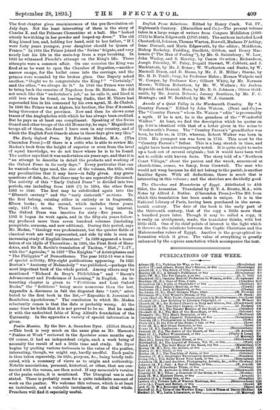The Early Oxford Press. By Falconer Madan, M.A. (The Clarendon
Press.)—If there is a critic who is able to review Mr. Madan's book from the height of superior or even from the level of equal knowledge, we do not know where he is to be found. The author says that it was undertaken six years ago, and that it is "an attempt to describe in detail the products and working of the Oxford Press in its early days." Every particular that can be wanted—the type used, the size of the volume, the title, with any peculiarities that it may have—is fully given. Any grave questions of date, &c., that there may be are separately discussed. The activity of this "Early Oxford Press" is divided into two periods, one including from 1468 (?) to 1684, the other from 1585 to 1640. The first may be subdivided again into the "fifteenth century" and the "early sixteenth" sections. To the first belong, existing either in entirety or in fragments, fifteen books ; to the second, which includes three years only, 1517 - 19, seven. Tben there comes a long interval. The Oxford Press was inactive for sixty - five years. In 1585 it began its work again, and in the fifty-six years follow- ing produced more than seven hundred volumes (including pamphlets, sermons, and new editions). During this period, says Mr. Madan, " theology was predominant, but the quieter fields of classical work are well represented, and side by side is seen an increasing study of English literature." In 1588 appeared a trans- lation of six idylls of Theocritus ; in 1591, the First Book of Hero- dotus, and Sir H. Savile's translation of Twat's, " Hist.," I.-IV., with the " Agricola; " in 1597 "The Knights " of Aristophanee and " The Philippics " of Demosthenes. The year 1612-13 was a time of special activity, fifty-eight publications appearing. In 1621 Burton's "Anatomy of Melancholy " was published,—perhaps the most important book of the whole period. Among others may be mentioned "Richard de Brey's Philobiblon " and " Bacon's Advancement and Proficience of Learning," in English. An in- teresting chapter is given to " Fictitious and Lost Oxford Books," the " fictitious " being more numerous than the lost, Appendix A. discusses in full the disputed date " 1468," attri- buted to the first book in the list,—" Expositio S. Jeronimi in Sembolum Apostolorum." The conclusion to which Mr. Madan reluctantly comes is that the date is probably wrong. At the same time he holds that it is not proved to be so. But he ranks it with the undoubted fable of King Alfred's foundation of the University. In the appendix a variety of special information is given.






































 Previous page
Previous page